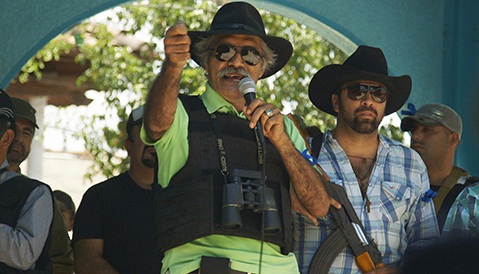Cartel Land Captures the Gritty Mexican Drug Wars
Documentary Shows the Violence, Heroes, and Innocent Caught in the Crossfire

It may seem implicit, but when watching Matthew Heineman’s Cartel Land, a documentary about the Mexican drug wars, words like “cinematic” and “filmic” come to mind. Filled with death-defying recordings courtesy of Heineman, who is the camera-toting eyewitness to street shoot-outs, border patrolling, and deep-night meth productions, the beautifully shot Cartel Land looks and unfolds like a fictional narrative film. There are Hollywood-like scenes of sweeping southwestern vistas, of heroic grandstanding from anti-cartel leaders, and of weapon-wielding villagers wrangling baddies and intimidating the military police out of their town.
But whereas the subjects and their actions may seem larger than life (especially the charismatic doctor and Autodefensas leader Dr. José Mireles), the action within is very, bleakly real. We see the severed heads of drug war victims and bear witness to their distraught and desperate grieving families. Heineman withholds from moralizing or attempting to pick sides in this war, choosing wisely to instead let the viewer judge.
There is no pure heroism or justice on this wide and ambiguous battlefield, only double-edges and deceits. Though Mireles seems like a savior, he loses control of his anti-cartel Autodefensas, which begins to mimic the terrorizing tactics of the drug lords. Then there’s Tim “Nailer” Foley, a somewhat tangential Arizonan vigilante who stands on the narrative sidelines, spouting anti-immigrant fantasies and coming off as more of a trigger-happy threat to his community than a protector. And the Mexican meth makers, hidden behind masks and smoke clouds in the desert, are the first to admit the harm caused by their production, but being steeped in poverty, they say, they have no other choice of livelihood.
Cartel Land effectively portrays the many ambivalences of the drug war. The violence is unpredictable and contagious, the heroes are corrupted by government handshakes or twisted motives, and the innocent are caught in the unending cross fire. Unlike a Hollywood movie, things are not conveniently tied up by the film’s end. We finish where we began, in the dark of the desert alongside meth cookery. The drug war monster hasn’t been tamed, only regrown with new heads, and the suffering, it seems, will continue for many years to come.



